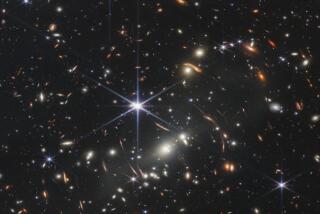A universe without purpose
- Share via
The illusion of purpose and design is perhaps the most pervasive illusion about nature that science has to confront on a daily basis. Everywhere we look, it appears that the world was designed so that we could flourish.
The position of the Earth around the sun, the presence of organic materials and water and a warm climate — all make life on our planet possible. Yet, with perhaps 100 billion solar systems in our galaxy alone, with ubiquitous water, carbon and hydrogen, it isn’t surprising that these conditions would arise somewhere. And as to the diversity of life on Earth — as Darwin described more than 150 years ago and experiments ever since have validated — natural selection in evolving life forms can establish both diversity and order without any governing plan.
As a cosmologist, a scientist who studies the origin and evolution of the universe, I am painfully aware that our illusions nonetheless reflect a deep human need to assume that the existence of the Earth, of life and of the universe and the laws that govern it require something more profound. For many, to live in a universe that may have no purpose, and no creator, is unthinkable.
But science has taught us to think the unthinkable. Because when nature is the guide — rather than a priori prejudices, hopes, fears or desires — we are forced out of our comfort zone. One by one, pillars of classical logic have fallen by the wayside as science progressed in the 20th century, from Einstein’s realization that measurements of space and time were not absolute but observer-dependent, to quantum mechanics, which not only put fundamental limits on what we can empirically know but also demonstrated that elementary particles and the atoms they form are doing a million seemingly impossible things at once.
And so it is that the 21st century has brought new revolutions and new revelations on a cosmic scale. Our picture of the universe has probably changed more in the lifetime of an octogenarian today than in all of human history. Eighty-seven years ago, as far as we knew, the universe consisted of a single galaxy, our Milky Way, surrounded by an eternal, static, empty void. Now we know that there are more than 100 billion galaxies in the observable universe, which began with the Big Bang 13.7 billion years ago. In its earliest moments, everything we now see as our universe — and much more — was contained in a volume smaller than the size of a single atom.
And so we continue to be surprised. We are like the early mapmakers redrawing the picture of the globe even as new continents were discovered. And just as those mapmakers confronted the realization that the Earth was not flat, we must confront facts that change what have seemed to be basic and fundamental concepts. Even our idea of nothingness has been altered.
We now know that most of the energy in the observable universe can be found not within galaxies but outside them, in otherwise empty space, which, for reasons we still cannot fathom, “weighs” something. But the use of the word “weight” is perhaps misleading because the energy of empty space is gravitationally repulsive. It pushes distant galaxies away from us at an ever-faster rate. Eventually they will recede faster than light and will be unobservable.
This has changed our vision of the future, which is now far bleaker. The longer we wait, the less of the universe we will be able to see. In hundreds of billions of years astronomers on some distant planet circling a distant star (Earth and our sun will be long gone) will observe the cosmos and find it much like our flawed vision at the turn of the last century: a single galaxy immersed in a seemingly endless dark, empty, static universe.
Out of this radically new image of the universe at large scale have also come new ideas about physics at a small scale. The Large Hadron Collider has given tantalizing hints that the origin of mass, and therefore of all that we can see, is a kind of cosmic accident. Experiments in the collider bolster evidence of the existence of the “Higgs field,” which apparently just happened to form throughout space in our universe; it is only because all elementary particles interact with this field that they have the mass we observe today.
Most surprising of all, combining the ideas of general relativity and quantum mechanics, we can understand how it is possible that the entire universe, matter, radiation and even space itself could arise spontaneously out of nothing, without explicit divine intervention. Quantum mechanics’ Heisenberg uncertainty principle expands what can possibly occur undetected in otherwise empty space. If gravity too is governed by quantum mechanics, then even whole new universes can spontaneously appear and disappear, which means our own universe may not be unique but instead part of a “multiverse.”
As particle physics revolutionizes the concepts of “something” (elementary particles and the forces that bind them) and “nothing” (the dynamics of empty space or even the absence of space), the famous question, “Why is there something rather than nothing?” is also revolutionized. Even the very laws of physics we depend on may be a cosmic accident, with different laws in different universes, which further alters how we might connect something with nothing. Asking why we live in a universe of something rather than nothing may be no more meaningful than asking why some flowers are red and others blue.
Perhaps most remarkable of all, not only is it now plausible, in a scientific sense, that our universe came from nothing, if we ask what properties a universe created from nothing would have, it appears that these properties resemble precisely the universe we live in.
Does all of this prove that our universe and the laws that govern it arose spontaneously without divine guidance or purpose? No, but it means it is possible.
And that possibility need not imply that our own lives are devoid of meaning. Instead of divine purpose, the meaning in our lives can arise from what we make of ourselves, from our relationships and our institutions, from the achievements of the human mind.
Imagining living in a universe without purpose may prepare us to better face reality head on. I cannot see that this is such a bad thing. Living in a strange and remarkable universe that is the way it is, independent of our desires and hopes, is far more satisfying for me than living in a fairy-tale universe invented to justify our existence.
Lawrence M. Krauss is director of the Origins Project at Arizona State University. His newest book is “A Universe From Nothing.”
More to Read
A cure for the common opinion
Get thought-provoking perspectives with our weekly newsletter.
You may occasionally receive promotional content from the Los Angeles Times.









